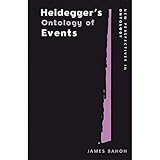Heidegger's Ontology of Events / James Bahoh.
Material type: TextSeries: New Perspectives in Ontology : NPOPublisher: Edinburgh : Edinburgh University Press, [2022]Copyright date: ©2019Description: 1 online resource (240 p.)Content type:
TextSeries: New Perspectives in Ontology : NPOPublisher: Edinburgh : Edinburgh University Press, [2022]Copyright date: ©2019Description: 1 online resource (240 p.)Content type: - 9781474443685
- 9781474443708
- 111.0924 23
- B3279.H49 B34 2020eb
- online - DeGruyter
- Issued also in print.
| Item type | Current library | Call number | URL | Status | Notes | Barcode | |
|---|---|---|---|---|---|---|---|
 eBook
eBook
|
Biblioteca "Angelicum" Pont. Univ. S.Tommaso d'Aquino Nuvola online | online - DeGruyter (Browse shelf(Opens below)) | Online access | Not for loan (Accesso limitato) | Accesso per gli utenti autorizzati / Access for authorized users | (dgr)9781474443708 |
Frontmatter -- Contents -- Acknowledgements -- Frequently Cited Works -- Introduction -- Chapter 1 The Methodological Ground of Heidegger's Ontology of Events -- Chapter 2 The Historical and Ontological Senses of 'Event' and their Relation -- Chapter 3 Dasein and the Precursory Question of Truth -- Chapter 4 Truth and Event in Beiträge zur Philosophie (Vom Ereignis) -- Chapter 5 Difference, Truth, and Event -- Chapter 6 Event, Ground, and Time-Space -- Conclusion -- Bibliography -- Index
restricted access online access with authorization star
http://purl.org/coar/access_right/c_16ec
Critically reconstructs Heidegger's concept of event - the most fundamental concept in Heidegger's later philosophyCritically examines Heidegger's concept of 'Ereignis' or 'event' and his arguments for the view that 'being' should be reconceptualised as 'event' Proposes a new methodology for reconstructing Heidegger's philosophy: diagenic analysisArgues that we find two important concepts of event in Heidegger's philosophy, not merely one as most commentators have heldShows how these concepts of event offer a framework for better understanding and responding to human alienation in the contemporary worldArgues that Heidegger's theory of events supports a form of ontological realism, not an anti-realist 'correlationism' as suggested by Meillassoux and Sheehan James Bahoh proposes a new methodology for explaining Heidegger's philosophy: diagenic analysis. This approach solves a set of interpretive problems that have stymied previous approaches to his difficult later work and led to substantial inconsistencies in the available scholarship. Using it, Bahoh reconstructs Heidegger's concept of event in relation to his theories of history, truth, difference, ground and time-space. In these contexts, Bahoh argues that Heidegger's logic of events entails a logic of difference that is prior to and constitutive for the logic of identity essential to traditional metaphysics. The logic of events explains the generation of ontological structures grounding individuated finite domains - that is, it explains the generation of the logic of worlds of beings.
Issued also in print.
Mode of access: Internet via World Wide Web.
In English.
Description based on online resource; title from PDF title page (publisher's Web site, viewed 02. Mrz 2022)


